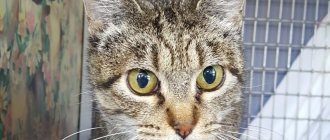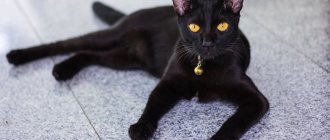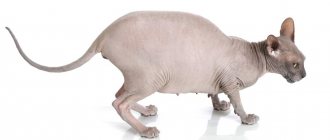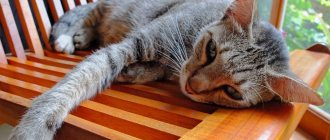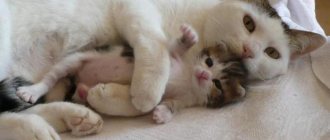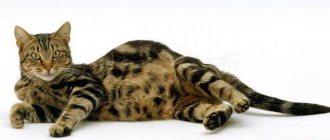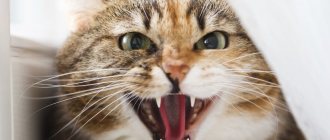No matter how hard a person tries to sleep longer, worries, affairs and responsibilities always interfere with him. But there is little that can distract cats from their dreams: on average, 16 hours a day they cause the envy of their owners, namely, they sleep serenely. If you count, How long do cats sleep? throughout their life, it turns out that they give 70% to sleep, and spend the remaining 30% on getting more tired and going to sleep.
Playing, tracking down prey, mastering new heights on the street or in the apartment - everything uses up a lot of cat energy, which can only be replenished by long and deep sleep.
Sleep standards for domestic cats
Each cat’s sleep norm is different: not only does it depend on the individual characteristics of the animal, but also on the energy expended during the day. One day the animal may be very tired from a long walk on the street, and on another day it may lie for half a day looking out the window - therefore, the duration of sleepy hours on these days will be different.
The total time allotted for dreaming can vary from 14 to 22 hours. What does total time mean: the pussy does not sleep “from bell to bell”, but easily alternates periods of sleep and activity. The cat gets the missing time in the arms of the owner and in any cozy corner. Cats sleep lightly, so they are easily interrupted by any loud sound, and, as if nothing had happened, they remain awake for some time, in order to soon fall asleep again.
Sleep norms for newborn kittens are different - they constantly doze next to their mother, waking up only to feed. Gradually, their waking hours increase, but they sleep somewhat less than adults. Older cats relapse into childhood and dream again constantly, waking up to litter and feed.
How long do adult cats sleep?
global $ads_google;
//data-ad-slot=”2475549904″ $ads_google = empty($ads_google) ? false : true; ?> if ($ads_google == false) {?> $ads_google = true; ?> } ?> If you compare how much an adult cat and a tiny newborn kitten sleeps per day , the kids will win. But then the emphasis shifts - the older ones sleep for a long time, and the kittens spend a lot of time playing.
For a healthy, tired cat, it will not be a deviation from the norm if he sleeps 20 hours in one day: his body may require such a long hibernation.
If an adult animal, which is one of the record holders for sleep among mammals, suddenly sleeps little, it means that it is in a state of stress. If this problem continues, the cat may lose a lot of weight and become ill due to nervousness.
In general, a cat needs to sleep 12-14 hours a day, but the total amount of hours spent on this is sometimes difficult to determine precisely because of the frequent alternation of periods of dreaming and activity.
How long do kittens sleep?
A healthy kitten at a tender age will easily sleep 22 hours in one day. This is not a reason to worry, but a variant of the norm. Age plays a significant role: if newly born kittens immediately fall asleep after eating, then cats at the age of one or two months play for a long time next to their mother, study the world around them and are in no hurry to fall asleep. A mother cat often spends much more time sleeping than her curious children.
If an older kitten sleeps a lot, and in addition to this, he has poor appetite and low activity, then this is a reason to consult a veterinarian with suspected illness.
The old cat sleeps a lot. Is it age related?
Contents hide
The old cat sleeps a lot. Is it age related?
Most likely, many cat fans have not even asked such a question - for them it is something taken for granted. And the very image of a sleeping cat is something so close, homely and dear. However, let's look at the question from a slightly different angle - from the point of view of physiology.
Age-related changes in the body of cats. A cat is considered senior when it reaches the age of 11 years. It is not at all necessary that an animal by this age has necessarily become decrepit - on the contrary, many animals do not show any special changes in appearance. It probably won’t be an exaggeration if we say: old age creeps up on cats unnoticed!
But time is time, it spares no one. At first, you will notice slight graying in the muzzle area, the coat will thin out and become dull, hearing may weaken, and interest in your favorite food will also cool down over time. Then it will be difficult for the cat to jump, it gets tired faster, refuses active games - in other words, physical activity weakens.
Long periods of sleep are normal for older cats. Its duration can be up to 20 hours a day. Does this surprise you? Little kittens sleep about the same amount of time!
Problems in a fairyland. Pay attention to how much sleep your older pet gets. If he sleeps relatively little and is more awake, then it is possible that he has developed diseases that haunt him. Most of these diseases are classified as geriatric - in other words, senile diseases. Older cats are much more likely to suffer from thyroid disease (hyperthyroidism). Among other clinical signs, a cat's metabolism develops to a certain critical point where it begins to burn too much of its body weight, despite its voracious appetite. This phenomenon, naturally, is accompanied by a huge release of energy, and the cat does not receive the amount of sleep it needs in old age. And, if hyperthyroidism itself generally goes without treatment, then the accompanying changes in the heart and liver will make themselves felt seriously. Fortunately, it is possible to maintain your cat's health with medication.
Oversleeping in old age may also hide other serious diseases, which the cat, as usual, will carefully hide. Another very common disease at this age is arthritis. Take a closer look, if it becomes difficult for a cat to climb up or climb stairs, then most likely she has been struck by this illness. Your veterinarian can help alleviate your animal's suffering if you contact him.
Another “senile” attack is also possible – the so-called cognitive dysfunction. Animals begin to get confused in space, go to the toilet past the tray, forget their name, etc. This is something akin to senile dementia in humans. We recommend that you have your pet's condition assessed by a veterinarian. It is clear that he is not able to restore your cat’s youth, but he will give you a number of practical tips on how to support the animal.
Let's respect old age! In turn, we will also offer you some valuable, useful tips that will undoubtedly help you and your pet.
Try, if possible, to maintain the same, familiar way of life for older cats, so as not to further injure the animals. Frightened cats, when stressed, stop sleeping at night and can cause a lot of trouble for others.
Protect your restless pet's sleep. In particular, a cat can be awakened by the first rays of the sun, filling the room at dawn. In this case, curtain the room tightly.
Due to the loss of previous tone in the muscles and joints, older cats prefer to sleep on hard surfaces. Try to make her crib more comfortable! If a cat loved to look at the world while lying on the windowsill, and now it’s become difficult for her to get there - come up with something like a ramp for her, bring joy to the animal!
The tone in muscles and joints can be maintained and even strengthened with simple exercises. Try exercising your cat for ten to fifteen minutes a day.
If the cat is blind or deaf, try to provide it with a comfortable environment, remove furniture with sharp corners, etc. Perhaps buy her a new tray with low sides if it has become difficult to use the old one.
If vision begins to deteriorate, and with the onset of darkness the cat begins to show increased anxiety and meow anxiously, use soft night lighting or night lights.
Show more attention to older pets. Now you already know that long and extra-long sleep is not just about age. Also be wary if there are sudden changes in your pet's sleep pattern. Perhaps there are medical problems behind all this.
Maybe you should bring a kitten into the house? We don’t think it’s such a good idea to pit childhood and old age against each other. An older cat may experience increased distress trying to keep up with a quick and curious kitten up the stairs. We know that stress is an inexhaustible source for the development of many diseases, so an elderly cat has absolutely no need for a young friend.
Original post: How Much Should My Senior Cat Sleep? Author: Dr. Laci Schaible. Source and photo:
How long do cats sleep after anesthesia?
The behavior of pets and their condition after surgery always worries worried owners.
If a cat is about to be sterilized, then naturally the owner will be concerned about how much she will sleep after the operation. The body cannot ignore anesthesia, so after it and surgery it will take time to recover. Some creatures recover from anesthesia very quickly and wake up immediately, while others take longer.
If we are talking about a cat, then the question of how long he will sleep after castration also has an answer: it all depends on the individual characteristics of the pet’s body. In any case, he will need the care and attention of his owner. The veterinarian will definitely give important recommendations on this matter.
Constant sleep after spaying and neutering
Sterilization and castration, which pet owners often resort to, is another reason why cats sleep all the time, both during the day and at night. Both sterilization and castration are serious interventions in the functioning of the organs and systems of the animal’s body. After the operation, the cat experiences serious stress; this condition requires full recovery, which the animal can receive in a dream. Hormonal changes in the body of a pet after sterilization or castration cannot be discounted. The cat or cat will be lethargic, drowsy and apathetic until the restructuring of hormones is completed and their body begins to function as before.
Sleep phases of cats
People who have cats in the house can constantly observe how a seemingly soundly sleeping pet suddenly jumps up and rushes at maximum speed to the kitchen, to the owner or to the door. For cats that have become well-adapted to resting during light naps, waking up abruptly is normal. These animals constantly pick up information from everywhere, so there is nothing strange in such a rapid succession of states.
Cat dreams are divided into two phases, which replace each other:
- slow phase: decreased blood pressure, low muscle activity, decreased heart rate, slow breathing. The eyes under closed eyelids, at the moment of falling asleep, slowly move a little and then stop
- fast phase: rapid heartbeat, change in breathing rate, rapid rotation of the eyes, slightly increased blood pressure and body temperature, possible shudders, movement of the limbs and ears.
The fast phase in adult cats takes up to 25% of the total time, in old cats 15%. The slow phase lasts 20-30 minutes, and then it is replaced by a fast phase for 5-7 minutes. Over a long period of sleep, the phases alternate several times.
Do cats dream?
global $ads_google;
//data-ad-slot=”2475549904″ $ads_google = empty($ads_google) ? false : true; ?> if ($ads_google == false) {?> $ads_google = true; ?> } ?> How much time cats sleep per day has been determined, now it’s interesting to find out whether four-legged friends have dreams. Neuroscientists studied this issue and came to the conclusion that domestic cats are no strangers to dreams. This is usually something that has to do with the cat's lifestyle. This could be a battle with a wild relative, an active pursuit of prey, exploration of a new territory, or something associated with strong emotions.
Differences in sleep depending on breed
Breed characteristics, character and temperament are also reflected in cat dreams. Of course, homeless “noblewomen”, forced to earn their own food, would also not mind sleeping all day - but who will give it to them? Such animals have to stay awake for at least five hours a day.
Another thing is well-fed domestic lazy people, not even necessarily very thoroughbred. “Indoor” pets, especially if they are sterilized, are able to sleep almost the entire day - up to 22 hours a day! Of course, every cat is a bright individual, but different breeds also have different attitudes towards sleep:
- The leaders in the Dormouse ranking are the imposing, handsome Persians - ambitious and narcissistic cats are very lazy and phlegmatic in everyday life;
Persian cats are big fans of taking a nap at their owner's feet.
- Many British, Burmese and American shorthair cats are distinguished by sanguine balance - they sleep “according to circumstances” and in moderation;
- Representatives of such aggressive and even dangerous breeds as jungle and Siamese cats cannot afford to sleep for too long - almost all the time they are tense and ready to attack, and relax only for a short time;
- and the cute bald ones stand out completely apart: hairless sphinxes, Devon Rex, Ukrainian Levkoy and other devoted and affectionate cats constantly need warmth and care - they are ready to sleep as much as they want, but only next to their beloved owner; the rest of the time, animals can show unusual activity, and when carried away, completely forget about sleep.
Hairless cats are actively awake and sleep soundly.
How and when do cats sleep?
If a cat does not sleep at the required hours, being in a relaxed state, but looks for a secret place for dreams, it means that she is not so comfortable next to her owner. Normally, a cat would rather prefer the master's bed than the corner under the sofa. An animal that completely trusts its owner easily falls asleep on his lap, turning over on its back and putting all four paws in front of it.
When a cat is 9 years old, she slept for about 6 years of that time.
The place to sleep will most often be located at some elevation, and it will be something soft and warm. The cat will stomp on the chosen bed, stretch, relaxing every muscle, and very quickly falls asleep.
There are also originals among cats, which seem to be smeared with honey on the owner’s laptop, important documents on the table or freshly ironed linen.
Cats sleeping problems
In cases where a cat, not exceeding its usual sleep norm, suddenly begins to constantly doze off and look drowsy, it is first determined whether this is due to pregnancy or weather conditions (excessive heat or extreme cold). If a cat spends more than 18 hours sleeping, then such drowsiness may come from some kind of disease. A cat's sleeping position can help identify the problem: a frozen posture like a sphinx or attempts to spread its limbs that are unusual for an animal indicate hyperthermia. Also, an excessive amount of sleep is an indicator of the onset of heart problems.
Other sleep disorders include insomnia. Stress caused by moving, the arrival of a new family member, or an influx of guests may be to blame here. Sometimes cats have seizures in their sleep - it’s better to film any oddities and then show it and the animal to a veterinarian.
When should your pet's sleep cause alarm?
Cats are nocturnal animals; it is believed that they should be awake at dusk, but in the apartment it is completely different. After the owner goes to bed, nothing interesting happens. The cat sees that the world has become boring, so he won’t play or entertain himself either.
In some cases, sleep disturbances should cause alarm to the owner:
- The pet began to sleep little, he is very active, mobile, does not rest at all, such symptoms are especially suspicious for an elderly ball;
- After waking up, your four-legged friend looks lethargic, feels unwell, and is noticeably depressed. Why is this happening? Most likely, the matter is due to the onset of the disease;
- The cat sleeps a lot, but sleep is poor. Often the pet cannot lie on the side where it feels pain; even standard palpation at home will reveal problem areas;
- The animal sleeps poorly and sleeps little, tosses and turns, meows pitifully, and asks for help. Or the cat has completely stopped resting normally, doesn’t eat at all, and behaves restlessly.
The appearance of such symptoms, any deviations in behavior: loss of appetite, fever and apathy may indicate that not everything is normal with the animal. It is better to contact a veterinarian who will examine the cat and, if necessary, help restore the usual routine.
Cats love to eat and sleep, this is not surprising, this is how an ordinary cat’s life works. Lack of care leads to cats sleeping for a long time, they become lazy homebodies - and this is completely normal. On the other hand, when your pet stops sleeping, you should think: is everything okay?

